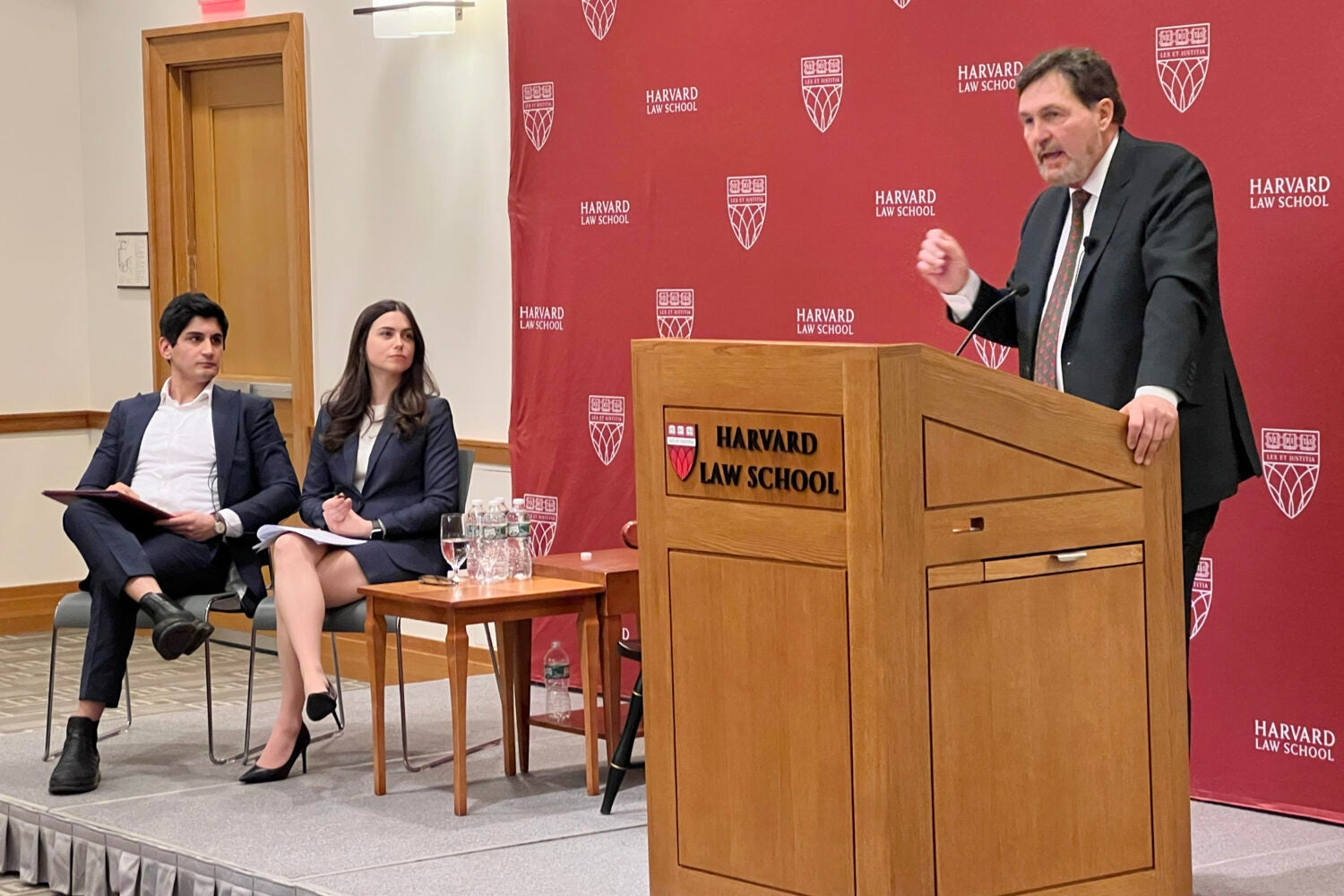Canada may not be a superpower, Canadian Supreme Court Chief Justice the Hon. Richard Wagner told a Harvard Law School audience on Friday. “But I like to think we are a superpower in terms of democracy.”
Presented by the Canadian Law Students Association, Friday’s talk at Wasserstein Hall marked the first appearance by a Canadian chief justice in Harvard Law School history. Before turning to questions from students in the audience, Wagner delivered remarks on access to justice, which has been his priority since his appointment as chief justice in 2017. He defined this as “good justice for all, rather than perfect justice for a few.”
Access to justice is both an elusive goal and a “democratic imperative,” he said. “In recent years, I hear talk of a golden age where everyone could afford a lawyer and have their problems solved quickly. That has never been true. Lawyers’ fees have always been expensive, and courts still struggle to provide meaningful access to people. Canadian courts are no exception. Much has been done in the past six decades, but we are all here today because there is so much more to do.”
He named specific measures his court has taken to further this goal. In his view, access to justice is connected to access to information, so he initiated steps to make the Canadian court’s actions more transparent. One was to hold an annual, two-hour press conference; another was to make an easily readable, one-page synopsis available for every decision.
“One way to maintain peoples’ faith in the institution is to explain what we do,” Wagner said. “So, we say in very accessible language what this decision is and what it means to you. This is not easy but we do it. We discovered that [the synopses] were being used by law professors, so it was a real success.”
“One way to maintain peoples’ faith in the institution is to explain what we do. … Open and transparent courts are an antidote to misinformation.”
A more creative method has been to hold annual court sessions away from the capital city of Ottawa, taking to cities, including Winnipeg and Quebec City, and opening the hearings to local audiences. “For a week, the nine of us will meet the public, talk to law professors, and hear two cases. We answer questions so people will understand exactly what we do and why we do it.” This, he said, can counteract false information that might be spread on social media.
“The spread of lies and half-truths can threaten democratic institutions throughout the world,” Wagner said. “Open and transparent courts are an antidote to misinformation.”
Diversity within the court is also necessary to reflect the populace, he said, noting that the Canadian Supreme Court appointed its first indigenous judge recently. Like its U.S. counterpart, the Canadian court has nine members, and its demographic makeup has changed over the years. It remains the world’s only bilingual and bijural court, deciding common and civil law cases in English and French.
“Citizens in any country governed by rule of law need to recognize themselves in the institutions, including the courts,” he said. “In Canada, I am happy to say that we are going in the right direction. Out of the last 70 appointments of federal judges, 50 percent were women. We have people from visible minorities, and from the LGBTQ minority as well.”
“Citizens in any country governed by rule of law need to recognize themselves in the institutions, including the courts.”
As a result, Wagner said, unanimous decisions are even less likely in Canada than they might be in the U.S. “I would be concerned if the nine judges were always unanimous for any important legal issues — I would feel like I was in China, Russia, or Iran. This doesn’t mean we should not aim for a consensus, but people with different lived experiences would have different philosophies. That is good, that is sound.” Every Canadian federal judge is now required to take courses in systemic racism, sexual assault law, and systemic disinformation. “All of these topics are relevant to access to justice, and we have taken steps to export that expertise outside of Canada.”
One questioner asked how the Canadian court avoids becoming overly politicized, when, they claimed, the reverse is arguably true in the U.S. In response, Wagner recalled spending time with U.S. Supreme Court Chief Justice John Roberts when the impending reversal of Roe v. Wade was leaked and noted a crucial difference in the U.S. and Canadian systems. “In Canada it is very hard, in fact nearly impossible, to determine where a judge will stand on a specific legal issue. We have no such thing as a political appointment.”
This, he said, is because each judge is appointed by the prime minister after recommendations from a bipartisan advisory committee; and neither political party is allowed to dominate. Wagner himself was appointed to different posts by Liberal and Conservative branches of government. Even the hearings are notably different: “It is not as polarized. In the U.S. a candidate will be cross-examined for hours. In Canada, it is more of a welcoming reception — very nice, very polite.”
To advance access to justice, he said, “It would be a mistake to believe that there is a special remedy, a magic formula. The way to answer the challenge is to have an open mind, to consider as many scenarios as possible. But if people don’t believe they can have trust in the judicial system, that is truly the beginning of the end.”
Want to stay up to date with Harvard Law Today? Sign up for our weekly newsletter.
